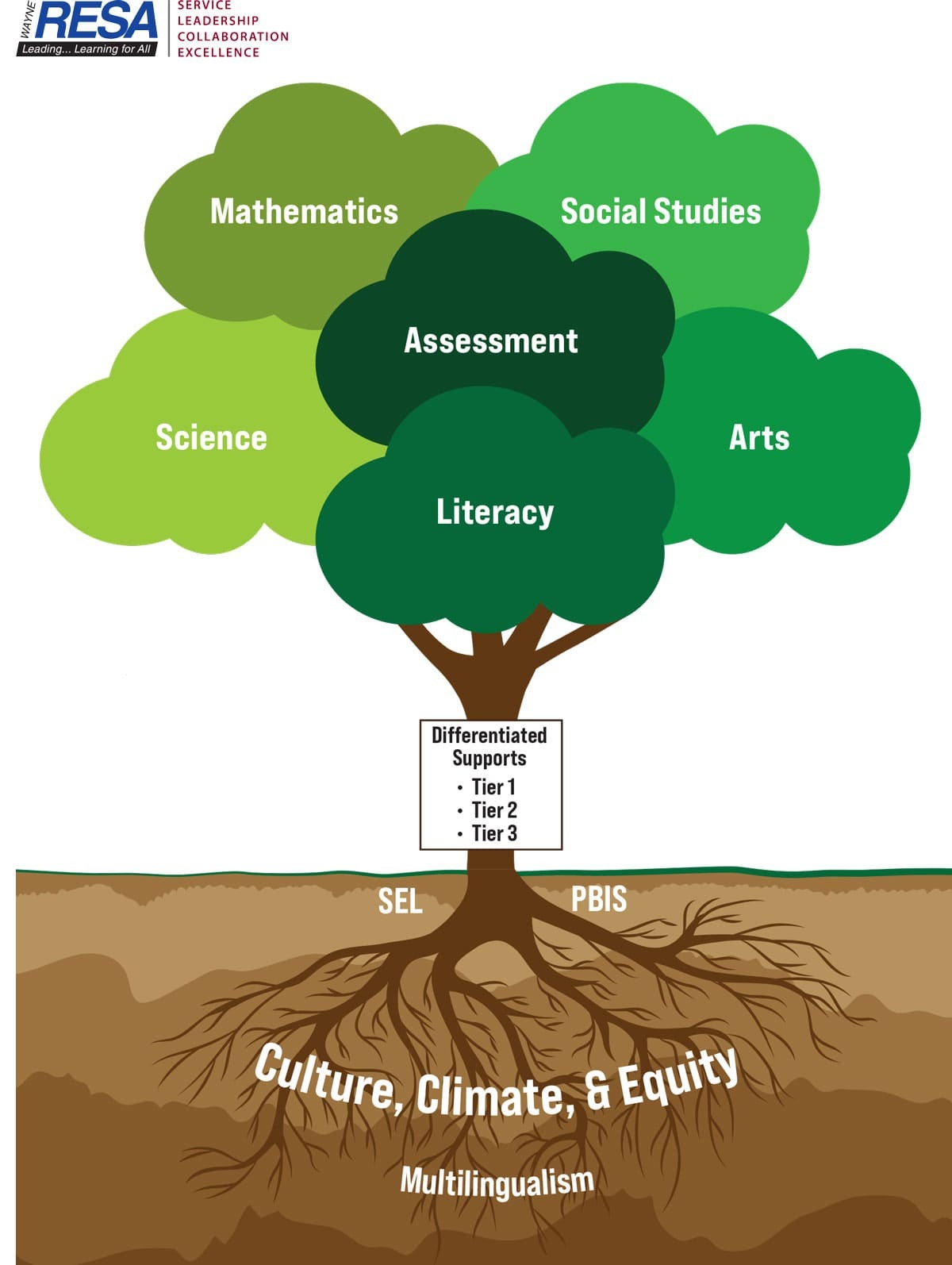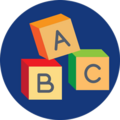Multi-Tiered System of Supports (MTSS)

About MTSS
Multi-Tiered Systems of Support (MTSS) is an integrated, multi-tiered system of instruction, assessment, and intervention designed to meet the achievement and behavioral needs of all learners. It is a framework designed to ensure high-quality instruction. The MTSS framework aligns to the Michigan Continuous School Improvement Process. The essential components to MTSS include: Instruction and Intervention, Data and Assessment, Implementation of Evidence-Based Practices, Problem-Solving, and Stakeholder/Family Involvement.
Whether new to MTSS or re-visiting the effectiveness of this framework in your school, use these tools to self-assess your systems of support.
Schools Focused on Equity and Whole Child Approach Foster Inclusive, Supportive Environments for Student Success
Schools rooted in equity, social and emotional learning, and Positive Behavior Interventions and Supports, develop a strong climate and culture that provides every student with the individual nurturing needed to achieve personal success. A Whole Child approach to education ensures that all students experience interdisciplinary learning at every moment of the school day, which challenges, engages, and supports students while providing healthy and safe engagement in the school community. The mindset shifts required to achieve this model of teaching and learning are foundational for transformative success for all students.
Training Opportunities
Information on Training Opportunities Coming Soon!
New - MTSS Quick Guide
School Attendance Intervention Quick Guide
District MTSS Quick Guide
Building MTSS Quick Guide
Classroom MTSS Quick Guide
Data MTSS Quick Guide
Coordination and Planning Tip Sheet
HMH Assessment Gain a Complete Picture of Student Achievement

Response to Intervention (RtI) Tier II - III
The IDEA 2004 requires schools to provide systematic, measured, appropriate educational interventions to students to ensure that students have been provided appropriate instruction. Response to Intervention (RTI) is a well-integrated system of instruction/intervention guided by child outcome data. These Field Guides to RtI were developed to provide schools with a guide to developing your tiered systems of support, particularly for learners needing more intensive interventions. Each field guide was developed to be reviewed by the school team as the school shapes the procedures that will best guide your decision-making for students.
Field Guides
Overcoming Barriers and Assessment Accommodations
Data Analysis Tips: Low-Tech Environments
Example of Curriculum-Based Measurement Probes
Glossary
Research-Based Interventions
Leadership, Team Building, and Professional Development for Response to Intervention (RtI)
Measuring Student Performance Levels and Progress
Other Factors Contributing to Learning Failure
Overview of Response to Intervention (RtI)
Parent Informed
Response to Intervention (RtI) Team
Web Resources
AimsWebPlus - a tool for teachers and educational teams in MTSS/RTI and special education contexts
Intervention Central - Response To Intervention (RTI) Resources
The Balanced Literacy Diet: University of Toronto - A Framework for Understanding and Teaching Literacy
What Works Clearinghouse - Evidence-based decisions in your classrooms and schools
Stages of Implementation
Exploration
The district is exploring the adoption or the development of a system-wide comprehensive Multi-Tiered System of Supports framework. The district forms an interdisciplinary leadership team with representation from across the system. After reviewing and studying a collection of research on MTSS and gathering initial input data the team determines stakeholder understanding and readiness to move to the planning stage.
Essential questions to consider
- Has the district/school considered an MTSS framework?
- Who might be identified to lead this work at various levels?
- Will your team include stakeholders who represent the various components of MTSS? (Social-Emotional, including families, social workers, nutrition, and community members; Academic, including general education teachers, interventionists, and special educators; and Behavior
- What supports/interventions are currently in place and implemented?
- Has your team surveyed stakeholders to determine the current reality of implementation and its outcomes?
- Is data used to determine supports?
- Has your team come to a consensus in their understanding of the research in MTSS by studying shared resources?
- Has your team considered the allocation of resources and the realignment of operating structures to support an MTSS framework?
- How will your district allocate time and funding to support MTSS implementation?
Planning
Based on the analysis of district/school data the leadership team determines guiding principles, beliefs, and outcomes. The district begins to define standards and expectations for what MTSS looks like in practice and plans for implementation of MTSS as indicated in Michigan’s state law. The MTSS leadership team uses the Michigan Department of Education’s Practice Profile as a guide to develop district implementation of an MTSS framework. The district examines the five essential components of MTSS. The leadership team investigates key actions taken by educators and leaders to determine their current state within each component along the developmental continuum. Based on the analysis of data compiled from the practice profile, the team determines the highest priorities and current areas of focus and communicates this work to all stakeholders.
Essential questions to consider
- Has your team referenced the MDE Practice Profile to support in determining guiding principles, beliefs, and outcomes?
- How might your team ensure that all stakeholders have a thorough understanding of the Multi-Tiered System of Support?
- How will we ensure that staff and administrators have the knowledge and skills to implement?
- Based on the readiness of your school, how will teachers and administrators be supported in the areas that are most relevant to students’ needs (e.g. teacher beliefs, assessment structures, whole child model implementation, equity-focused practices)?
- What measurement will you use to audit interventions, the curriculum for bias, knowledge integration, and to ensure alignment to the structures of MTSS?How will students' and their families’ voices be honored and validated in the preparation process?
- How do your school/district improvement goals align with the Multi-Tiered System of Supports?
- How will we ensure that systems are in place to support high-quality implementation?
- How might your MTSS leadership team plan for long-term sustainability?
Implementation
The district uses the MTSS framework developed by the leadership team that is based on the Michigan Department of Education’s Practice Profile. Communication of the framework is shared with all stakeholders and continuous professional learning is supported by the district to ensure all stakeholders have a shared understanding of the essential components of MTSS.
Essential questions to consider
- How does the MTSS leadership team determine entry points to provide teachers with professional development that includes a coaching component to develop the knowledge and skills needed for successful MTSS implementation?
- How does our MTSS framework align with other core district initiatives?
- How is this message shared? What standardized procedures will be used to measure student outcomes and fidelity of implementation?
- How will the MTSS leadership team allow for continuous reflection on the implementation of the MTSS work that may result in adjustments?
Sustainability
The district has fully implemented the MTSS framework and has evident alignment across all levels of the system. The MTSS leadership team regularly monitors and evaluates the MTSS framework to ensure it is aligned, and sustainable, and informs the district improvement plan; changes may be made when opportunities exist. The implemented framework is working to reach all learners, including families and the community. Lastly, there is an ongoing and shared commitment to professional learning and coaching to ensure all learners in the educational setting receive a high-quality learning experience.
Essential questions to consider
- Does ongoing evolution occur as the system incorporates new knowledge and practices through a continuous improvement process?
- Do we revise policies and procedures at the school and district levels to align with our MTSS goals?
- Is there a plan in place to support onboarding new staff and/or stakeholders?
- Is there another focus area that needs to be addressed?
MDE Documents and Resources
According to the Michigan Department of Education (MDE) Multi-Tiered System of Supports (MTSS) Practice Profile, MTSS is a comprehensive framework comprised of a collection of research-based strategies designed to meet the individual needs and assets of the whole child at all achievement levels. MTSS intentionally interconnects the education, health, and human service systems in support of learners, schools, centers, and community outcomes.
Additional resources on Social-Emotional Learning (SEL)
Contact Us
Related Pages








